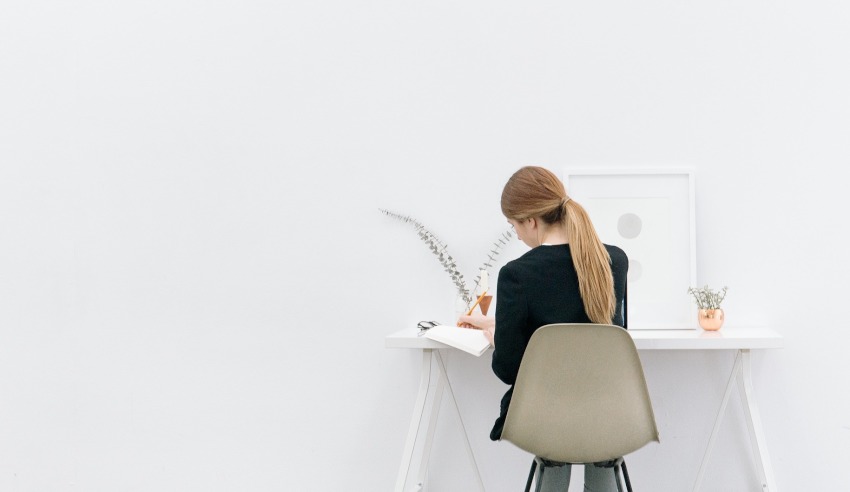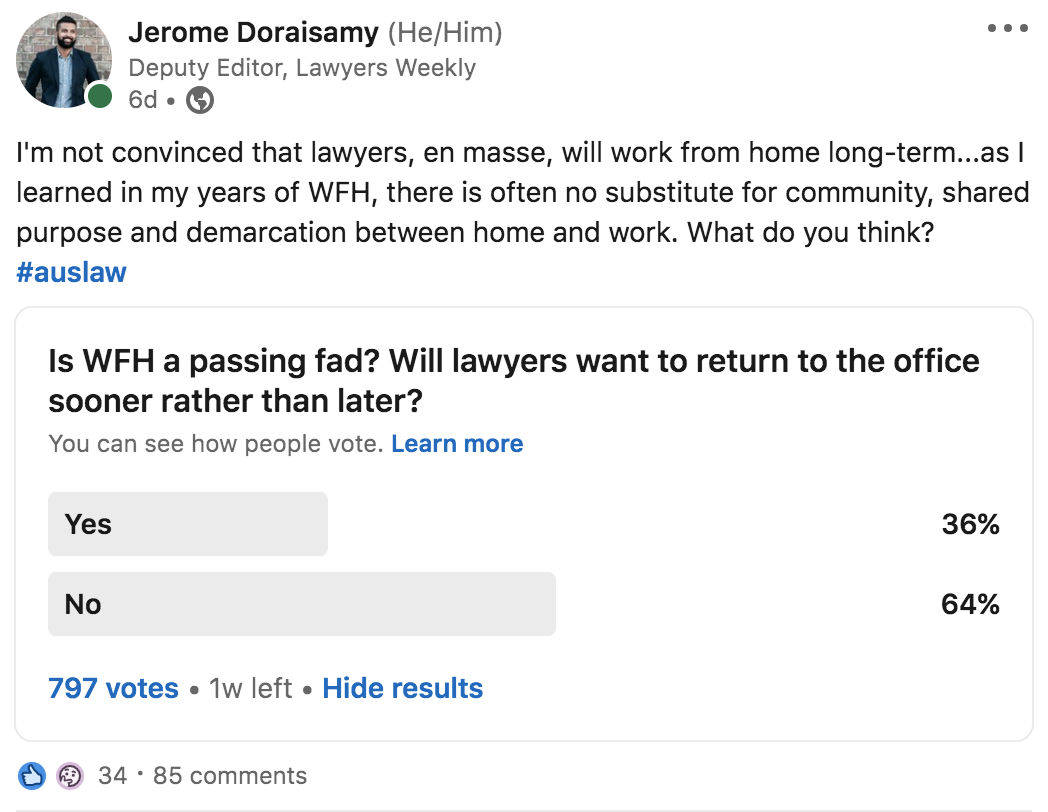Last week, I asked my LinkedIn network if they believe lawyers will tire of remote and flexible working and want to come back to the office. The results surprised me.

My years of WFH
From the outside looking in, my post-lawyer life looked exciting and rewarding – which it was (and remains). Moreover, I felt as though I had wrestled back control of my existence from the crippling, debilitating anxiety and depression that so plagued my final year of law school and early experiences as an admitted solicitor.
However, working for myself and being a desk nomad had its drawbacks.
Often, I would go entire days without talking to a single person. I found it difficult to eat my dinner at the same table I’d been working at all day, and wearing casual clothing (even activewear on occasion) meant I subconsciously felt that my days lacked purpose.
By the end of that three-year period, the shine of working away from an office, without colleagues, had well and truly worn off. I was feeling increasingly isolated, and my anxiety and depression started to return. Once again, I had more days in the week where tears were a feature than days where my eyes remained dry.
Then, in 2018, I started with Lawyers Weekly and, for the first time in years, I had colleagues, a routine and a dress code again. Almost overnight, I started feeling better.
WFH during COVID-19
Since the COVID-19 pandemic began over 18 months ago, I have been thrilled to see the legal profession roll with the times by not only facilitating flexible working arrangements but actively encouraging them. The conventional wisdom at this juncture is that WFH is here to stay – its mainstream adoption means that the profession will not be reverting to pre-pandemic office conditions. This is a great outcome for lawyers of all stripes.
Despite this, I’ve retained a certain fear that, like I experienced, the novelty of WFH will soon wear off, and a lack of time surrounded by colleagues will lead to increased social isolation, exacerbating already astronomical rates of psychological distress in law.
My experience, of course, differs in key ways from many lawyers: most notably that I had no colleagues with whom to liaise, no office space to attend at least a few days a week, and – on a personal level – I was single, and thus had no partner to lean on when times got tough. Moreover, as one with a predisposition to anxiety and depression, I was perhaps not well suited to deliberate vocational solitude at that point in my life.
But the fear is still valid, in that there will likely, if not certainly, be lawyers who ultimately realise that they are not as well equipped for long-term WFH and need an office environment – both for a more direct sense of community and purpose and the incidental professional development that can come with physical proximity.
What do lawyers think?
To find out how lawyers feel about this, I posted a poll on LinkedIn, asking my connections if they think lawyers will eventually want to return to the office. The volume and speed of responses staggered me.
Here is a screenshot of the poll, as it stands as of the time of filing this story:

To see the full poll results and ensuing comments, click here.
My poll was not scientific by any means and should not be taken as such. But, if the bounty of responses that flooded my notifications is anything to go by, WFH is no passing fad, with two-thirds of legal professionals voting that such remote and flexible working will remain for many if not most lawyers.
They may be right. As Bright Machines general counsel Victoria Libin pointed out, teams could successfully work virtually and remotely over several years.
Speaking in her personal capacity on LinkedIn, Ms Libin responded to the poll, noting that she had a “complete global team” of senior lawyers and that the company she worked for had had a remote/WFH policy since 2012.
“The company saved millions in office space and, with good use of technology, big projects such as M&A were never a problem. We bonded over coffee/beer sessions (depending on time zones) where we played games, talked, were vulnerable and got to know each other. Once a year, we would get together in person,” she recalled.
“Everyone appreciated not wasting one or more hours getting to and from the office. We mentored lawyers virtually and had methods for virtual career development for the whole company.”
Law firms have to adapt, Ms Libin argued, to the modern world and learn to work more like their clients.
“As a consumer of legal services, I’d rather that the fees that my company pays get used for true career development of young associates or for better client service than for expensive office space,” she said.
Peer Legal managing principal Peter Moran agreed that WFH could be a successful long-term approach and wrote that “social interaction, shared purpose and community can all be achieved without being in the same location all the time, or even most of the time”.
However, some do think WFH may be a passing trend, like barrister Damien Toohey, who opined that “people are enamoured with having brekky [sic] on the lounge at 8:30am and then sending a few emails until 10:00am, having a shower, going for a coffee and then maybe working in the afternoon, etc. But you have to work in teams to get stuff done, and in my humble opinion, that just cannot be done from a home setting”.
ECP Legal partner Shaaron Dalton also felt that there might be some reversion to office life: “Although we are certainly seeing WFH become more commonplace and it will be a standard expectation for many, in time I think many lawyers, particularly younger lawyers and partners, will start to value the separation of home and work and the increased learning opportunity, banter and increase business opportunities of in-person and office-based work.
“Gradually, I see an organic return to a balance of more days and time in-office once the pandemic conditions wane.”
Justice Family Lawyers principal Hayder Shkara backed this: “Staff last year were enjoying WFH and were very hesitant to come back into the office. After the last lockdown, people have realised the importance of the office environment. Staff were asking to come back.”
Perhaps as a compromise of sorts, most lawyers who commented in response to the LinkedIn poll appear to favour a hybrid model, whereby lawyers can split their time between home and office for their working hours.
The quantum of time spent in various locations will, of course, be either at the discretion of an employer or determined in consultation with individual employees, but not having to choose one or the other is a true silver lining coming out of the age of coronavirus for many professionals.
Hybrid models, The Remote Expert founder and director Emma Heuston surmised, “will be what lasts”.
“If that’s the case, hopefully it will allow for more of a ‘choose your own adventure’ [culture],” she said.
AMP legal counsel Mike Tangonan said that such hybridity would come down to personal, team and work matter preferences.
“A situational balance of flexibility is ideal,” he proclaimed.
“Sometimes, focus work is easier at home. Sometimes, for specific types of work, it’s easier in the office with all the resources (e.g. printing, library, etc.). It’s unlikely that there is a perfect balance, and any balance now might change with the circumstances of individuals as things arise.”
3D HR Legal special counsel Cara Leavesley: “Modern lawyers have the capacity to realise that the ability to build a community and shared purpose is not limited to physical proximity. The demarcation between home and work is a tougher challenge.”
A hybrid model, therefore, might help lawyers “turn off”, Ms Leavesley surmised.
“[This model can help lawyers] have a flexible life outside of the office and perhaps even achieve better mental health outcomes. Clients have certainly embraced the model, and as such, many lawyers will continue to follow suit.
“I personally consider that the benefit of ‘free range lawyers’ extends far beyond office rental savings,” she concluded.
Reflections moving forward
There may be kinks to iron out, and legal employers will likely undergo some trial and error to determine the right balance – both for the businesses and individual employees. However, so long as legal professionals have diversity of choice so that they can better identify how best to be productive, in accordance with their team needs and individual idiosyncrasies, the profession will be in good hands.
As aforementioned, I’m thrilled to see such modernisation in a profession that I love. Long may it continue. I just hope that, ultimately, my fears of exacerbated mental health issues are unfounded.

Jerome Doraisamy is the managing editor of professional services (including Lawyers Weekly, HR Leader, Accountants Daily, and Accounting Times). He is also the author of The Wellness Doctrines book series, an admitted solicitor in New South Wales, and a board director of the Minds Count Foundation.
You can email Jerome at: